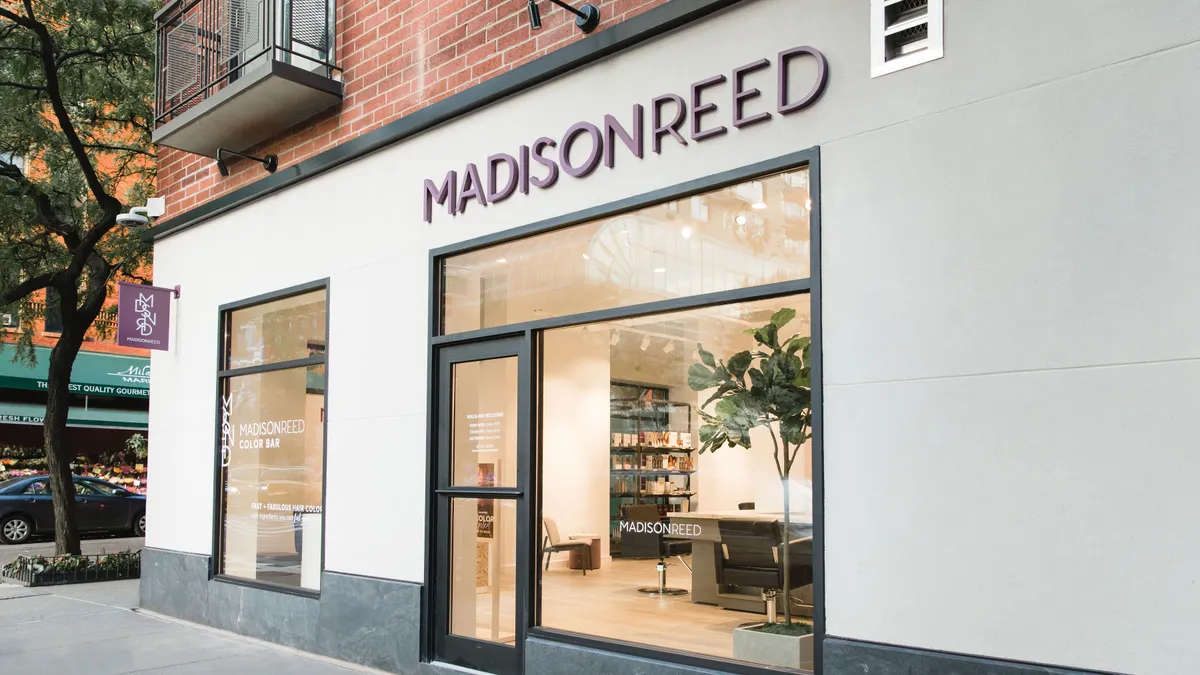The writing has been on the wall for Lord & Taylor for some time.
Originally, that was just an intentional creative flourish in the company logo that was first used in the 1930s, taken from the stylish real-life signature of one of its top executives. But more recently, that has morphed into a dark metaphor, reflecting lost sales and brand cachet, as parent Hudson's Bay Co. neglected it while lavishing attention and money on sibling U.S. department store Saks Fifth Avenue.
That may soon change, if subscription apparel rental service Le Tote can seal the deal it made with HBC on Monday to take over most of Lord & Taylor's stores and assets for $100 million. The startup, which was founded in 2012 and offers apparel rental for $79 per month, is still working out the financing, according to the companies' press release. Cowen & Co.'s Oliver Chen, in a client note emailed to Retail Dive, said it will likely prevail.
It's a tie-up that, if it works, could be pivotal for both companies.
What's in it for Le Tote?
The department store, though forgotten in many ways, gives Le Tote some new advantages.
"L&T provides Le Tote with the 'big-box' platform that will allow them to reimagine their next phase of retail experience," Jonathan Treiber, CEO of offer management platform RevTrax, said in comments emailed to Retail Dive, noting that Le Tote and its customers will gain a greatly expanded assortment of merchandise. "Le Tote has an opportunity to single-handedly disrupt traditional department stores and physical retail by taking the struggling L&T's key assets and leveraging them to transform their business into a bigger and better new retail leader of tomorrow."
That could be instrumental in Le Tote's competition with rivals Stitch Fix and Rent the Runway, which operate (as Le Tote does now) almost entirely online, and lack the marketing edge that physical locations can offer. "It's a great deal for Le Tote who — apart from the brand awareness the deal itself will bring — will benefit from the lower cost of customer acquisition and significant physical media value that brick and mortar retail brings," Doug Stephens, founder of Retail Prophet and author of "Reengineering Retail: The Future of Selling in a Post-Digital World," told Retail Dive in an email.
Brick and mortar could become more important in the space as other retailers also get in the game, according to Joe Yakuel, CEO of digital marketing firm Agency Within. "As traditional retailers like Banana Republic and Urban Outfitters start to dip their toes in the fashion rental waters, the L&T acquisition gives Le Tote a pre-built infrastructure that they can use to build their own brick and mortar rental business, rather than starting from scratch," he told Retail Dive in an email. "It remains to be seen how big the retail rental market can be compared to that of online rentals, but this deal helps Le Tote stave off competition from larger, more established retailers."
A new chance for a neglected retailer
With this move, Lord & Taylor launches from the moribund landscape of department store retail to the rarefied air of apparel resale, rental and subscription — growing, cutting edge segments that Cowen & Co. estimates "are well positioned to grow 20% or higher annually."
Moreover, the department store may be gaining what it hasn't had in years — an owner with a better appreciation of its strengths, which include an assortment aimed at stylish middle-income women and a flair for visual merchandising.
"They still care about merchandising at Lord and Taylor, and they still care about the customer experience, whereas Macy's has lost track of any core differentiator," retail analyst and consultant Sanford Stein, author of "Retail Schmetail," told Retail Dive in an interview. "I think that they will do it with an eye on curation, what kinds of things are strong for rental versus what you still want to sell. It's a very interesting and complementary approach to the evolution of what retail was to what it is becoming."
While it's not clear which 38 of Lord & Taylor's 45 locations will go to Le Tote, many of them are charming modern buildings, several in suburban areas, that Shawn Grain Carter, professor of fashion business management at the Fashion Institute of Technology, said "will be a jewel of a showroom to showcase Le Tote's rental fashion merchandise and to build its subscriber base. It will also give them an automatic supply chain with L&T store locations throughout America."
Lord & Taylor could also gain new customers, including from much younger generations than usually shop there, according to Carter and Stein.
"Customers can rent their clothes and return them to Lord & Taylor, while shopping for new rental merchandise simultaneously," Carter told Retail Dive in an email. "Le Tote can then use this new opportunity to be 'first in class' as a provider of rental fashion goods using a direct to consumer approach with better differentiation for their customer. Stitch Fix, The Real Real, and Rent the Runway are still key competitors in this marketplace."
Le challenge
But Le Tote is also taking on Lord & Taylor's weaknesses, and the deal is peculiar for both, others say.
“Lord + Taylor has been passed around from owner to owner for years, decaying the brand to the point most consumers, including me, have no idea who they are or what they stand for anymore," Paula Rosenblum, RSR co-founder and managing partner told Retail Dive in an email. "Don't forget, Lord + Taylor is now being sold on Walmart.com. The deal itself is also strange on many levels."
That includes the stipulation that, according to the companies' release, HBC and Le Tote as of 2021 will have options to reassess Lord & Taylor's fleet. "This may include HBC recapturing select locations to determine their highest and best use, including possible redevelopment into mixed-use properties with a variety of services, experiences and retail offerings," the companies said Wednesday.
"That is something that doesn't make immediate logical sense," Rosenblum said in an email, adding that, while resale and rental are growing retail segments now, they're not likely infinite. "Sure they're hot, but how many do we need? And what happens to the rentals when they get tired? On the one hand, it's a plus for environmental sustainability, but again, there's a limit to market size."
In fact, RevTrax's Treiber sees it as more of a "liquidation" of Lord & Taylor. "Le Tote's big bet is that they can successfully make the necessary sweeping changes at such enormous scale within a short time-frame," he said. "For L&T, I believe their brand and business as we know it today is over. The future of L&T is dependent on a successful rebranding to Le Tote, while taking the best of their assortment, merchandising and supply-chain infrastructure and converting their business into a massive omni-channel rental business going forward. My prediction is that within 18 months, L&T will be a distant memory."
The real winner
Some analysts actually see HBC, rather than Le Tote or Lord & Taylor, as having by far the most to gain from this deal.
For starters, the "transaction is consistent with HBC's plans to focus on Saks and Hudson's Bay and will give HBC attractive exposure to new talent and capabilities," according to the Cowen note.
It's also yet another indication of HBC's preoccupation with real estate, something that brought Lord & Taylor into HBC Governor Richard Baker's portfolio in the first place. The banner launched Baker's retail career when his real estate firm acquired it in 2006, and it's continued with the acquisition of HBC, Saks and other retail companies. In recent months, though, Lord & Taylor, like HBC's investments in Europe, has been an asset to unload, including its Italianate flagship on Fifth Avenue in New York this year.
"From my perspective, HBC is slowly transforming from retail company to investor/real estate company," Stephens said. "It's been years since I've seen any real signs of a defined, articulated retail strategy aimed at reimagining or reinventing their business. Rather, it's been all about the acquisition and liquidation of assets and holdings."
In this case, from what has been made public so far, Nick Egelanian, president of retail real estate development firm Siteworks, sees little attention to retail or "any long term commitment to the stores."
"In essence, It appears that HBC dumped the chain for little more than salvage value — and looking further into it, the buyer is not even really a retailer," he told Retail Dive in an email "HBC, probably as a condition of landlord and/or lender approvals, will remain liable on the Lord and Taylor leases and makes no guarantees as to the future of the business."
The ultimate question, Stephens says of HBC's approach to its holdings, "is 'to what end?'"
The answer could be — the end of the department store and the mall. Lord & Taylor is a bit player, considering it "does only about $1.4 billion in annual volume or about 6% the size of Macy's," according to Egelanian.
"But this is just one more small step in the unwinding of the American regional mall model," he said, "which has been in steady irreversible decline since full-line department store volumes and market share began to decline starting back in the mid-1980's."





















